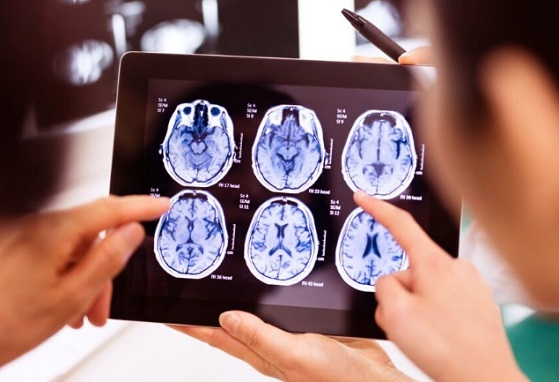Enlarged Perivascular Spaces in the Brain Linked to Neuropsychiatric Symptoms in Long COVID
Nikhil Prasad Fact checked by:Thailand Medical News Team Feb 24, 2025 1 month, 3 weeks, 1 day, 1 hour, 53 minutes ago
Medical News: Scientists Discover Possible Brain Changes in Long COVID Patients
A groundbreaking study conducted by researchers from multiple prestigious institutions has revealed structural brain changes in individuals suffering from neuropsychiatric post-COVID syndrome, commonly referred to as long COVID. The study, which involved experts from the German Center for Neurodegenerative Diseases, Otto-von-Guericke University-Germany, Jena University Hospital-Germany, the Centre for Clinical Brain Sciences at the University of Edinburgh-United Kingdom, and the Centre for Intervention and Research on Adaptive and Maladaptive Brain Circuits (C-I-R-C) in Germany, sheds light on how COVID-19 may cause persistent neurological symptoms.
 Enlarged Perivascular Spaces in the Brain Linked to Neuropsychiatric Symptoms in Long COVID
Enlarged Perivascular Spaces in the Brain Linked to Neuropsychiatric Symptoms in Long COVID
Neuropsychiatric symptoms such as brain fog, fatigue, depression, and difficulty concentrating have been widely reported among long COVID patients. Scientists have been investigating the possible causes of these lingering symptoms, and this
Medical News report explores the role of perivascular spaces (PVS) in the brain. These small fluid-filled cavities surrounding blood vessels are important for brain health, but their enlargement has been associated with neuroinflammation, aging, and neurological diseases. The researchers sought to determine whether patients with long COVID exhibit changes in PVS volume, which may provide insights into the neurological effects of the virus.
Study Design and Key Findings
The study analyzed brain scans from 80 individuals, including 50 long COVID patients experiencing neuropsychiatric symptoms and 30 healthy individuals. Using advanced imaging techniques, the researchers measured the volume of perivascular spaces in two key regions of the brain: the basal ganglia and the centrum semiovale. The results indicated that individuals with long COVID had significantly larger perivascular spaces compared to those without post-COVID symptoms. The extent of these changes also increased with age, suggesting that older individuals may be more susceptible to COVID-19-related brain alterations.
One of the most striking findings was the relationship between the duration of long COVID symptoms and PVS enlargement. Patients who had experienced neuropsychiatric symptoms for a longer period exhibited greater PVS expansion. This suggests that persistent symptoms may be linked to ongoing structural changes in the brain, reinforcing the idea that long COVID has a lasting impact on neurological health.
What Causes Perivascular Space Enlargement in Long COVID
The researchers believe that COVID-19 may disrupt the blood-brain barrier, the protective layer that separates the brain from harmful substances in the bloodstream. When this barrier is compromised, inflammatory molecules and immune cells can enter the brain, potentially leading to neuroinflammation and damage to surrounding brain structures. This could explain why long COVID patients continue to experience cognitive and emotional difficulties months or even years after recovering from t
he initial infection.
Another possible explanation is the impact of COVID-19 on cerebral circulation. The virus has been shown to affect small blood vessels, which could lead to an accumulation of fluid in perivascular spaces. Such changes have been observed in conditions like small vessel disease and dementia, raising concerns that long COVID could contribute to long-term neurological decline.
Implications and Future Research
These findings highlight the need for further research into the long-term effects of COVID-19 on brain health. If PVS enlargement proves to be a biomarker of neuropsychiatric post-COVID syndrome, it could be used to identify individuals at risk and guide treatment strategies. Future studies may explore whether interventions targeting neuroinflammation and vascular health can help reduce these brain changes and alleviate symptoms.
The researchers also emphasize the importance of monitoring long COVID patients over time. Longitudinal studies could help determine whether PVS enlargement reverses as symptoms improve or whether it remains a persistent feature of the condition. Understanding the underlying mechanisms may also pave the way for new therapeutic approaches aimed at protecting the brain from COVID-19-related damage.
Conclusion
The discovery of enlarged perivascular spaces in long COVID patients provides crucial evidence that the virus can induce lasting brain changes, particularly in individuals experiencing neuropsychiatric symptoms. This study underscores the need for continued research into the neurological impact of COVID-19 and the development of targeted interventions to support affected individuals. While much remains to be understood, these findings represent a significant step forward in unraveling the complexities of long COVID and its effects on the brain.
The study findings were published on a preprint server and are currently being peer reviewed.
https://www.researchsquare.com/article/rs-6042521/v1
For the latest COVID-19 News, keep on logging to Thailand
Medical News.
Read Also:
https://www.thailandmedical.news/news/russian-study-reveals-concerning-diffuse-brain-changes-in-acute-and-post-covid-19-phases
https://www.thailandmedical.news/news/two-years-after-infection-covid-19-found-to-have-restructured-the-brain-making-it-dysfunctional
https://www.thailandmedical.news/news/malaysian-researchers-find-that-long-covid-individuals-are-likely-to-have-executive-function-deficits-and-altered-brains
https://www.thailandmedical.news/articles/coronavirus
https://www.thailandmedical.news/pages/thailand_doctors_listings
